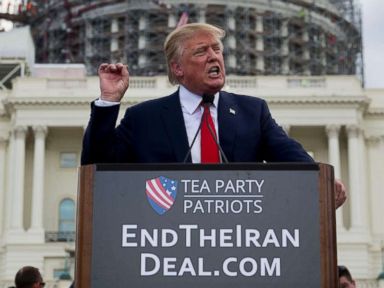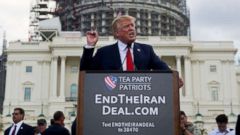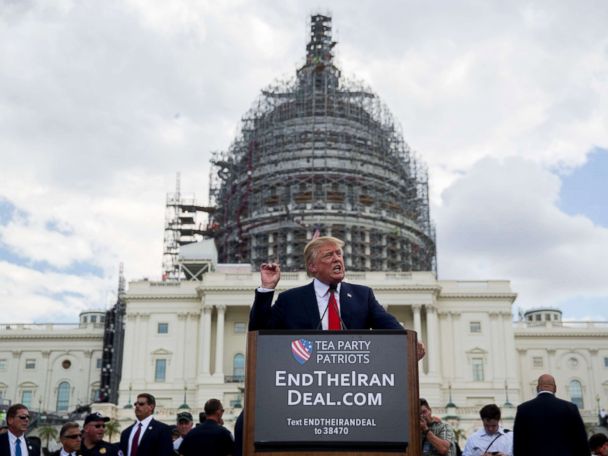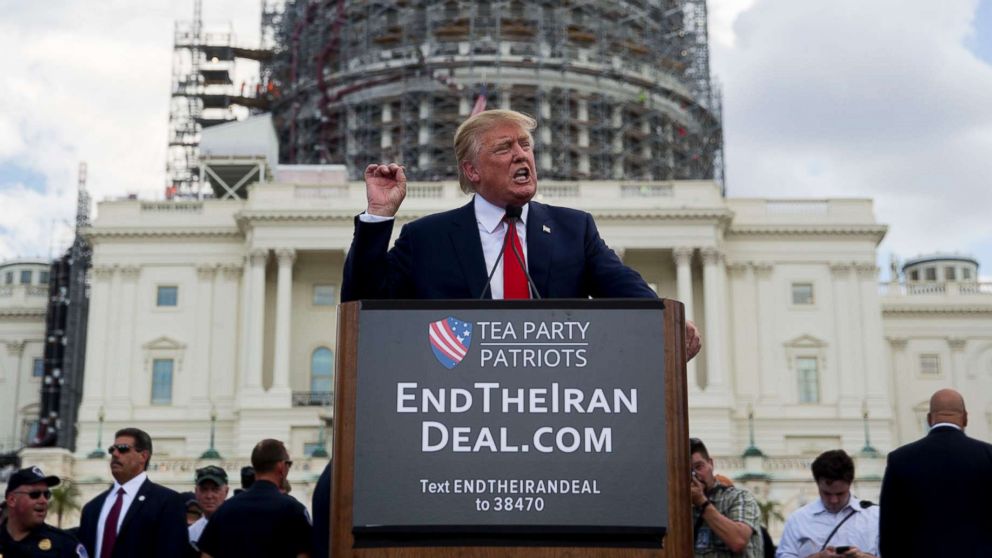





President Donald Trump is expected to announce Friday that the Iran nuclear deal no longer serves U.S. national security interests.
This decision, which has been referred as “decertification,” would be a significant declaration but would put Congress in charge of whether or not to follow up with action, triggering a 60-day window for lawmakers to re-impose sanctions against Iran that were suspended in 2015 as part of the agreement.
Trump could also ask Congress to impose additional non-nuclear sanctions — such as penalties against Iran’s ballistic missile program — on Iran, which would not end U.S. participation in the nuclear agreement. He could also ask lawmakers to amend the existing law requiring he re-certify Iran’s compliance with the agreement every 90 days.
Tehran and world powers in July 2015 crafted a deal that eased sanctions on Iran in exchange for stepped-up international monitoring of its nuclear development activities. The agreement reduced the amount of nuclear fuel Iran can keep and extended the “breakout time” needed for Iran to create a single bomb. Some of Iran’s facilities are now also subject to constant monitoring, with others subject to inspections after a waiting period.
Top officials on the Trump national security team, including Defense Secretary James Mattis, have said Iran has technically complied with the nuclear deal.
Republicans critical of the initial deal have urged the administration to enforce it.
“As flawed as the deal is, I believe we must now enforce the hell out of it,” House Foreign Affairs Committee Chairman Ed Royce, R-Calif., said in a hearing Wednesday. “Let’s work with allies to make certain that international inspectors have better access to possible nuclear sites, and we should address the fundamental sunset shortcoming, as our allies have recognized.”
Even Sen. Tom Cotton, R-Ark., one of the most vocal critics of the Iran deal and supporters of decertification, has recommended holding off on “snapping back,” or restoring immediately, the nuclear sanctions lifted as part of the deal. He called the move a “backward-looking step” and said Congress should instead impose new ballistic sanctions and lift some of the Iran agreement’s sunset provisions which allow some regulatory measures to expire after certain periods.
The goal with such actions, according to Cotton, would be to bring Iran back to the negotiating table to strengthen the original deal.
But some Obama-era officials who worked on the agreement said that hope was unrealistic.
“I would love to see Iran come back to the table, apologizes for everything and agree to all of our demands,” Philip Gordon, White House coordinator for the Middle East during the Iran negotiations, told ABC News. But he called such a notion a “fantasy.”
Sen. Bob Corker, R-Tenn., the chairman of the Senate Foreign Relations Committee who led the charge against the bill and wrote a law forcing congressional oversight of the Iran agreement, has also expressed skepticism that decertifying the deal is the right decision.
“You can only tear these things up one time. It might feel good for a second, but one of the things that’s important for us is to keep our allies with us,” he said, referring to the other signatories of the Iran deal which include China and Russia as well as the European Union.
The White House has been in touch with Capitol Hill for the past two weeks over its Iran decision. White House national security adviser H.R. McMaster was on Capitol Hill Wednesday evening briefing top Republican lawmakers on the administration’s forthcoming announcement.
Secretary of State Rex Tillerson has also been briefing key lawmakers on the administration’s plans for the agreement, and met with Sen. Ben Cardin, D-Md., Wednesday at the State Department.
Sen. Chris Coons, D-Del., who was among a group of Senate Democrats who met with McMaster last week, said the White House was open to negotiating the Corker-authored bill that requires the president to certify the deal every 90 days in the first place.
Coons told reporters in a conference call earlier this week that he believes Trump should just continue to affirm that Iran is complying with the deal but said he’d be open to amending the requirement “if that’s what’s required to get the president to continue to embrace” the Iran deal.
ABC News’ Benjamin Siegel contributed to this report.
